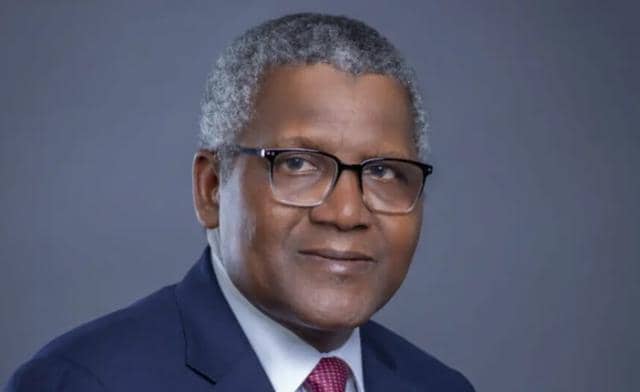Aliko Dangote, Africa’s richest man and chairman of Dangote Group, has advised Nigerians to stop depending on foreign countries for medical treatment.
He made this appeal during a panel discussion at the Gates Foundation’s Goalkeepers event, which held in Lagos on Wednesday.
Diaspora Digital Media (DDM) gathered that Dangote emphasized the urgent need to begin the local production of essential drugs in Nigeria to reduce reliance on foreign healthcare.
According to Dangote, it was time for Nigerians, especially the wealthy and political class, to treat themselves locally when sick rather than flying abroad.
He insisted that stopping health tourism must go hand-in-hand with producing pharmaceuticals within the country.
“What we need to do is to make sure we stop this health tourism,” he stated during the event.
“We should now get in to start producing our own drugs,” Dangote declared.
He stressed that strategic collaboration with global partners like Bill Gates and the Gates Foundation is essential to achieving this target.
Dangote noted that his foundation has previously partnered with the Gates Foundation to eradicate polio in Nigeria.
He also mentioned that their joint efforts had helped significantly in improving nutrition across the country.
While pointing to the economic gains made through the cement and fertilizer sectors, Dangote gave examples of how local production has transformed Nigeria’s status.
He said Nigeria had moved from being the second-largest importer of cement to the top cement exporter in Africa.
According to him, this industrial shift occurred because of massive investments by his company to reverse Nigeria’s dependency on foreign products.
He similarly cited improvements in fertilizer production as a success story of Nigerian industrial growth.
In his words, “Nigeria now, not only export, we actually export 37% of our fertilizer to the United States of America.”
He revealed that the second-largest fertilizer plant in the world was built from scratch by the Dangote Group, and it now serves international markets.
Speaking on energy, Dangote pointed out that the recently launched 650,000 barrels-per-day Dangote Refinery had started reversing Nigeria’s petroleum import dependence.
He said in May 2025 alone, the refinery exported 400,000 metric tons of petrol.
According to him, this milestone effectively ends Nigeria’s reliance on imported petroleum products.
“We did what nobody has ever done before,” he said, referring to the construction and operation of the massive refinery.
The Goalkeepers event, hosted by the Bill & Melinda Gates Foundation, was held in Lagos for the first time this year.
The conference brought together global leaders, policymakers, and innovators to assess the world’s progress on the United Nations’ Sustainable Development Goals (SDGs).
Present at the event were prominent figures including Bill Gates, Lagos State Governor Babajide Sanwo-Olu, and Gombe State Governor Inuwa Yahaya.
The event served as a platform for examining pressing global development issues, with Nigeria’s health sector taking center stage in the conversation.
Dangote’s call is likely to reignite debates about healthcare equity and the elite’s use of foreign medical services.
His comments arrive at a time when many Nigerians still lack access to basic healthcare, despite high levels of outbound medical tourism by the political class.
Analysts say Dangote’s remarks carry weight due to his proven track record of industrializing several sectors of the Nigerian economy.
Health experts argue that local pharmaceutical production would not only make medicine cheaper and more accessible, but also improve national health security.
They note that during the COVID-19 pandemic, Nigeria struggled to import vaccines and medical supplies because of global export restrictions.
Stakeholders are now calling on the Nigerian government to create enabling policies for local drug manufacturing.
They insist that regulatory support, tax breaks, and strategic funding will be needed to attract investment into pharmaceutical production.
Public health advocates are also pushing for stronger research institutions to back up the development of indigenous medicines.
The Nigerian Medical Association (NMA) has repeatedly expressed concern over the country’s dependency on foreign medical services.
They say improving health infrastructure, training, and drug manufacturing is the only sustainable way forward.
Meanwhile, the Dangote Foundation’s continued partnership with the Gates Foundation is expected to play a significant role in strengthening Nigeria’s healthcare capabilities.
Dangote’s declaration at the Lagos summit now places the burden on both public and private sector actors to act on local drug production.
If successful, it could significantly reduce the billions of naira spent annually by Nigerians on treatment abroad.
With the Dangote Refinery and Fertilizer Plant already reshaping Nigeria’s industrial landscape, attention is now turning toward healthcare as the next frontier.
Observers say Dangote’s influence and track record suggest that his next focus, pharmaceutical production, could bring another transformational shift.
For millions of Nigerians facing daily challenges accessing drugs and treatment, this could mark the beginning of long-awaited health sector reform.




